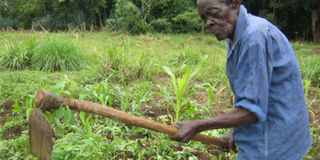At 108, Iganga man still going strong

Mr Sefatia Kyirongero attends to his maize garden recently. He grows traditional crops such as maize, beans and cassava. PHOTO BY YAZID KYOLISIGIRA
IGANGA- At 108 years, Mr Sefatia Kyirongero, a resident of Busowobi Village in Nakigo Sub-county, Iganga District, is believed to be one of the oldest people in the area.
Mr Kyirongero, who aspires to surpass 200 years, says he has never fallen sick in the last 55 years.
He takes herbs and wild plants to fight diseases.
According to Dr Angela Namala of Jinja Regional Referral Hospital, it’s possible for a person to live longer if they take good care of their bodies.
“Herbal intervention and nutrition are crucial for one’s body,” she says.
Mr Kyirongero says he has never had any kind of sickness, not even a simple cold and hasn’t taken medicine or visited a health facility since.
Even when he comes in contact with someone with any airborne disease such as flu and cough, he would not contract it.
This, he attributes to, among others, eating traditional foods such as potatoes, cassava, maize, yams and vegetables as well as wild fruits.
With a few strands of grey hair, his teeth are relatively intact and very few people can tell his age.
However, when asked about his age, Mr Kyirongero says: “I was born on September 3, 1909 - during the reign of chief Nsobani.”
This reporter caught up with Mr Kyirongero when he was working on his maize garden. At his home, you are welcomed by a picture he took with the Bishop of Central Busoga Diocese Patrick Wakula, on his birthday party on September 3, which he said was organised by his grandchildren.
During the celebrations, Patrick Izimba Gologo, the hereditary Chief of Kigulu Chiefdom, one of the 11 chiefs that make up Busoga Kingdom, corroborated his age and so have some residents.
Last week, a senior official from Uganda Bureau of Statistics, who requested to remain anonymous, told Daily Monitor Mr Kyirongero was indeed 108 years based on the information obtained during the 2014 population and census.
He digs with considerable energy for about 15 minutes without taking a break on his garden which comprises crops such as maize, beans and cassava.
He is also still going strong at his carpentry workshop where he makes products such as hoe holders, wooden doors, windows, mingling sticks and mortars. These products are made from trees that he planted around his home and are sold by his grandchildren.
“I am still strong and I don’t see why I should remain seated at home. Digging helps me remain healthy and physically fit,” he says while twisting his elbows and head to show his fitness levels.
Mr Kyirongero adds that in his 30s, he was an avid wrestler, who rarely lost fights.
His wrestling exploits, he explains, took him across competitions in Busoga sub-region; and it was because of his tactics and winning skills that his fans nicknamed him ‘Wakayima’.
“I was so good at marking my opponents and whenever we had a fight, revellers would chant: Wakayima, teach him a lesson,” he says.
Work and education
Mr Kyirongero has ever worked as a casual labourer at Kakira Sugar Works. He says he studied up to Junior One at Bukonte Junior School in Nakalama Sub-county, Iganga District.
He dropped out of school to help his parents with farming, adding that his father, the late George Kyirongero, was a carpenter and while at home, he used to train him in crafts and carpentry where he gained skills.
He has a lot of history to tell across the political, social and cultural spectrum. Notably, how men of the colonial era barred women from eating chicken until the Europeans came and banished the practice.
“Men made it a taboo for women not to eat chicken; but one day, a European man came and told a rural gathering that refusing women from eating chicken was the reason why some of them were not producing children. It was from then that women started eating chicken and nothing happened to them,” he narrated.
Pressed for the origin of the taboo, Mr Kyirongero explains that men were simply gluttons, stereotyping women as inferior and denied them chicken because it was a delicacy.
His opinion about Land Bill
The elderly, who owns several acres of land in the village, says he used to admire President Museveni, but the proposed Land Amendment Bill before Parliament has made him rethink his obsession for him.
The Bill, he says, reminds him of former President Apollo Milton Obote, who allegedly wanted to grab his land.
“I used to love (President) Museveni of all the Presidents; but I hate his policy on land. People started grabbing our wetlands and now they want to take even where we stay like what Obote wanted to do,” he says.
This newspaper could not independently verify this.
Family
The widower, father of seven and grandfather of 30 children, lost his two wives: Getrude Babiwemba and Norah Kanseka, 28 years ago.



